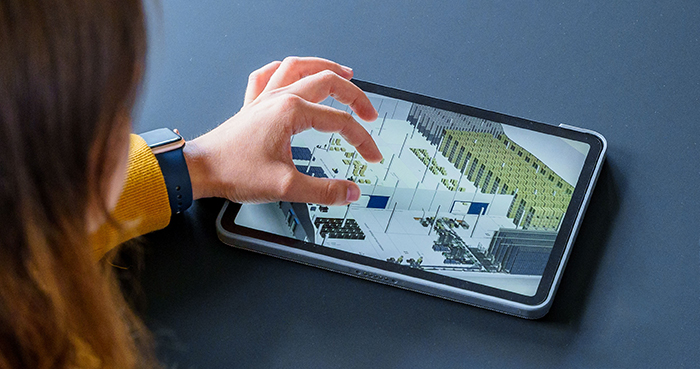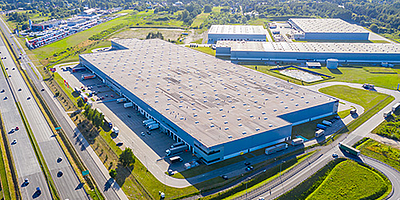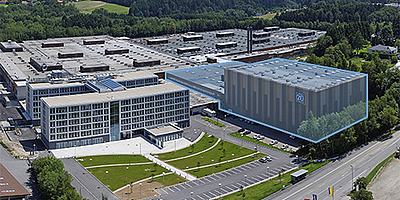Logistics planning and consulting For your intralogistics capabilities
Sophisticated logistics planning is the starting point for every successful logistics project and ensures that possible savings are identified and material flows are optimised, among other things.
Successful warehouse logistics is made possible through comprehensive strategy and logistics consulting and logistics planning that is based on this. Together they form the basis for ensuring your internal operational capabilities in the long term:
cover material flows, productivity and profitability in all areas with efficient processes – taking the full SAP integration of your processes into consideration at all times.
FAQs: Comprehensive logistics planning for long-term capabilities
Logistics planning is an essential building block for logistics projects of any size, because it is used to determine the most economical solution for the long-term performance of your warehouse. In terms of time, logistics planning follows the so-called logistics consulting phase, in which the current situation is recorded and ideas for a possible target state are discussed. Logistics planning is usually divided into two phases: The basic determination and rough conception (phase 1) and the detailed and implementation planning (phase 2).
Logistics planning is recommended for every planned logistics project, whether it is a new building, an extension or a modernisation through SPS-Retrofit project. The objective of logistics planning is to ensure in advance that the logistics warehouse will be able to perform in the long term and, for instance, that the SAP integration of processes will be taken into full consideration.
You can benefit from the following results:
- Development of the most profitable solution for supply chain management tasks
- Protection for investments and decisions, logistics cost projections
- Planning for logistics processes and material flows
- Identification of bottlenecks and demonstration of measures
- Creation of sound decision-making foundations
- Product modifications informed by logistics and production factors
- Consideration of capacity reserves and extension stages
- Neutral tenders for all necessary work
To find the most profitable solution for your internal logistics tasks, the basis is established in multiple phases and rounded off through detailed implementation planning. The solution that will be implemented with IGZ logistics planning is designed both to suit current requirements and to have the flexibility to respond to growth.
As similar planning phases and considerations are often gone through in the restructuring process by means of logistics planning, you will benefit from your planner and implementer having expertise from a wide range of projects in different industries. The IGZ logistics consulting team can take advantage of a great wealth of experience, as well as established and standardised SAP processes. As an implementation partner, IGZ guarantees the reliable SAP integration of existing and new systems technology independent of supplier and without using external middleware, unnecessary interfaces or subsystems.
You benefit from IGZ being a planning partner with implementation experience and an implementation partner with planning experience. We are responsible for and implement what we have planned.
Logistics planning is a matter of trust: Why IGZ is the right partner for you
At IGZ, you can benefit from expertise from a wide range of projects in different industries. After all, similar planning phases and considerations are always gone through for our customers in the restructuring process by means of logistics planning. In this way, our logistics consulting team can take advantage of a great wealth of experience and established and standardised SAP processes and always give you a suitable reference.
![[Translate to English:] Partnerschaftliche Zusammenarbeit | IGZ [Translate to English:] Partnerschaftliche Zusammenarbeit | IGZ](/fileadmin/user_upload/Automation/Logistikplanung/NEU/igz-partnerschaftliche-zusammenarbeit.jpg)
With IGZ as a planner and implementer, you can ensure precision, care and engineering quality. We set the course for your logistics planning to find the most profitable solution for your internal logistics tasks.
You can…
- react flexibly to future developments
- receive advice regardless of the type of technology or manufacturer
- avoid starting from scratch and benefit from many years of logistics planning and implementation expertise
- benefit from SAP-controlled standardised processes
Do you have further questions or would you like further information?
Contact us and we can discuss this with you!
The IGZ phase plan for your logistics project
In the following phases, you can realise your planned new building, extension or modernisation.
We will guide you from the initial planning steps to implementation and beyond:
Phase 1: General concept
For the basic evaluation and situation analysis, the profitability and performance of your warehouse will be taken into consideration. We record your existing article and order structures, as well as your existing and planned SAP processes in logistics and logistics data. The relevant requirements are then processed accordingly. To do this, IGZ focuses on analysing material, personal and temporal factors across the entire period of use.
The general concept is created using traceable assumptions, projections and calculations, taking into consideration all relevant warehouse parameters.
A digital twin is created as early as the rough planning stage, which, starting with data analysis, is later used for simulation through to startup.
Here you can see our services and portfolio:
- Determination of the automation level of the solution
- Layout plans (CAD) in 2D or 3D
- Creation of multiple implementation options
- Evaluate robotic picking and packing machines
- Layout potential and weakness analysis
- Concept selection and recommendation
- Recording of process requirements inc. SAP EWM deployment analysis
- Budgeting
- Profitability calculation


![[Translate to English:] Übersicht Winkler | IGZ [Translate to English:] Übersicht Winkler | IGZ](/fileadmin/_processed_/c/f/csm_igz-logistikplanung-wareneingang_8361efcce7.jpg)
![[Translate to English:] AKL-Kommissionierung bei Winkler | IGZ [Translate to English:] AKL-Kommissionierung bei Winkler | IGZ](/fileadmin/_processed_/b/5/csm_igz-logistikplanung-akl-kommissionierung_693e55dcba.jpg)
Phase 2: Detailed planning
After the general concept has been defined, a detailed concept is planned, consisting of things like a detailed layout, process description and IT concept. All solutions are worked out independent of the technology and manufacturer used. The decisive factor for us is whether the potential solutions will suit your company structure and requirements. IGZ works completely independently of individual suppliers. The logistics solution that will be implemented with IGZ logistics planning is also designed both to suit current requirements and to have the flexibility to respond to growth.
Here you can see our services and portfolio:
- Layout in 2D or 3D
- Validation of material flow incl. planning simulation
- Detailed planning of processes
- Use of MTM analyses and 3D tools for ergonomic workplace design
- Coordination of construction work
- Tender layout
- Tender documentation
With detailed planning completed, implementation starts with execution project planning through to startup support after go-live.
IGZ logistics planning services


A complete redesign of a logistics centre on “green grass” is usually called greenfield planning. The advantage of this approach is that you are completely free of existing structural requirements and can set up a new, individual logistics system. You can also get rid of outdated practices.
On the other hand, brownfield planning is used for the logistical modernisation of facilities in existing buildings. Typically, this involves the modernisation of individual components or a complete retrofit of your facility. However, modifications or extensions to existing buildings can also deliver your desired outcome (capacity expansion, removing bottlenecks, increased performance, etc).
In the logistics IT industry, the question of “greenfield or brownfield” is gaining another meaning, as SAP customers are currently carrying out their transformations from SAP R/3 to the SAP S/4HANA Business Suite, one after the other. This also has an immediate effect on existing IT solutions like SAP Warehouse Management (SAP WM) for example, or the connection of existing WMS/MFR systems to SAP.
We are your partners and can create a road map and development plan with you, whether you have greenfield or brownfield requirements.
Nowadays, logistics planning is only considered complete if you also provide effective options for CO2savings and, in the process, the use of climate-friendly technologies. "Green logistics" and the reduction of emissions play a central role in the planning of a new building or an expansion. After all, it pays off in the long term to invest in climate-friendly and energy-saving measures.
When planning, we take into account from the outset where you can set the course in your intralogistics projects.
Approaches can be found in the following areas, for example:
- Energy management and energy optimization As is well known, the best energy is that which is not consumed in the first place. However, in order to be able to save energy efficiently, it is first important to determine the "status quo". With the monitoring of the current, load-related energy consumption, the search for improvement possibilities in terms of energy optimization begins. We show you already in the planning phase which tools and possibilities are available for the operation of such plants. The use of such tools during operation provides clarity, for example, as to where the respective load peaks occur and therefore allows conclusions to be drawn in order to prevent these load peaks from occurring in the first place.
- Energy recovery/restoration Large energy consumers such as storage and retrieval machines not only consume electricity, but can even generate (recover) electricity through their braking effect. Ideally, energy can be fed back into the power grid. Whether such approaches are worthwhile for your plant can be determined in advance.
- Intelligent building technology and photovoltaic systems In new logistics facilities in new real estate, the most modern building technology is naturally used. Here, the architects or the construction planners usually already take into account topics such as intelligent building control technology and ventilation systems, the use of renewable energies instead of fossil heating and fuels, geothermal energy, building insulation (energy-efficient building envelope) and electromobility. Even the newly installed photovoltaic systems on the roof of the logistics property are now part of "good practice" to generate electricity for the company's own warehouse operations in good weather. One can even go one step further in logistics planning and provide for the connection between intelligent building technology and warehouse control systems (such as energy management in SAP).
- Selection of sustainable plant technology (suppliers) Certified, long-lasting quality from service providers in the German-speaking region with the "Made in DACH" quality claim in particular will outlast many years in a reliable and high-performance manner. Here you can usually be sure that both
- installed components
- the design of racks (steel construction, aluminum profiles, etc.)
- the cabling as well as among other things
- electrical components used
- Optimization of space consumptionThisincludes, for example, the intelligent zoning and reorganization of storage space so that fast-moving items can be reached in less time and with less (energy) expenditure.
- Control of system technologyHere, among other things, the order load is scrutinized to avoid and reduce peak loads: Optimized control of system technology and movement strategies ensure that, for example, storage and retrieval machines cover fewer long distances and thus save energy. Here, there are definitely differences regarding the mechanical suppliers as well as the best possible combination of plant technology and (PLC) controls used.
meet the highest quality criteria and promise a long service life.
In all these aspects you will benefit from our experience gained in projects for companies in your own or similar industries. For us it is a matter of course to plan your logistics center from start to finish also from sustainability aspects or at least to take them into account. Our goal: to help your logistics project achieve maximum efficiency and environmental compatibility - because environmentally compatible new construction or modernization projects can also contribute to a longer building service life. And it also increases the value of your logistics property.
For more information on Green Logistics, click here.
Do your material flows need fine-tuning or do they need to be made more efficient?
If your processes have grown historically, you might be experiencing issues with a lack of transparency and long lead times. Cycle times in production are becoming increasingly short, and market requirements for logistics are constantly changing. There may also be bottlenecks in your automatic system and at particular times of day when the materials-handling technology is working above capacity.
All of these are signs that it is the right time to revise material and goods flows to create a restored, capable intralogistics system. Through optimised material flow control, susceptibility to error can be reduced, efficiency increased, logistics costs lowered and lead times shortened.
The renewal or revision of material flow planning involves the planning and organisation of internal material flows. With this in mind, all types of physical goods movements, material and information flows, as well as all logistical processes from goods arrival to departure and the infrastructure (systems, processes and buildings) are examined.
IGZ believes that all processes for warehouse management and material flow control need to be consistently mapped in your SAP system, allowing you to achieve the maximum consolidation of competencies.
The SAP Material Flow System (SAP MFS) module used for material flow control is an integrated component of SAP Extended Warehouse Management (SAP EWM) and facilitates more efficient material flow movements. Moreover, IGZ is able to successfully integrate industrial manufacturing equipment components from all established manufacturers. And all without subsystems. This allows you to avoid interfaces and unnecessary applications.
You can find more information on this topic on our information page “SAP Material Flow System (SAP MFS)”.
![[Translate to English:] Shuttle Simulation | IGZ [Translate to English:] Shuttle Simulation | IGZ](/fileadmin/_processed_/e/2/csm_igz-logistikplanung-simulation_8900d21bea.jpg)
![[Translate to English:] Shuttle Simulation | IGZ [Translate to English:] Shuttle Simulation | IGZ](/fileadmin/_processed_/b/7/csm_igz-logistikplanung-shutlle-simulation_90414433ea.jpg)
With simulation and emulation tools, you can shorten the introduction phase between SAP, PLC and mechanical systems enormously and safeguard the planning and test scenarios of your logistics system.
With simulation and emulation tools, you can shorten the introduction phase between SAP, PLC and mechanical systems enormously and safeguard the planning and test scenarios of your logistics system.
With the help of a planning simulation, you can see your planned facility as an animated 3D model. You can experience the full operation of the logistics system in moving images and therefore assess factors like throughput performance and the impact of different storage strategies before starting the project.
Emulation goes beyond simulation: here, a detailed, functional logistics system simulation is created with all drive and technical details, as well as the existing interface logic, allowing you to test out neighbouring systems and interactions.
The special part: this model is designed so precisely that the connection between SAP EWM and PLC controls – like the subsequent facility – can be tested comprehensively (e.g. the PLC/facility emulation for SAP EWM).
Scope of planning simulation and emulation services:
- Evaluation of different types of layout and facility technology
- Virtual logistics design based on SAP EWM
- Comparison of different processes and strategies in SAP EWM/MFS
- Analysis of interference scenarios
- Minimisation of lead times
- Optimisation in interaction with SAP ERP
![[Translate to English:] Digital Supply Chain Management | IGZ [Translate to English:] Digital Supply Chain Management | IGZ](/fileadmin/_processed_/d/7/csm_igz-supply-chain-management_c833bcd319.jpg)
The pressure of digitalisation in logistics is growing and the digital transformation of the supply chain is forging ahead. Digital supply chain management makes the supply chain more transparent and efficient. This will also allow your company to become more resistant to unforeseen influences and changes in trends.
Nevertheless, not all companies need an equally high level of digitalisation. Partially automated processes may be sufficient, instead of fully automated ones. During logistics planning in SAP EWM/MFS deployment analysis, we determine the actual IT needs for your supply chain management tasks. Of course, this also takes the entire SAP integration of processes into consideration.
With SAP, you have access to modules including the following along the value chain for your processes:
- Stocking up of your raw materials incl. production supplies (SAP EWM)
- Systems needed for the production of your goods (SAP ME/MII, SAP DM)
- Disposal of production waste and storage of your finished products (SAP EWM)
- Internal transport, resource control and control of your facility technology (SAP EWM/MFS)
- Goods-to-person and person-to-goods picking (SAP EWM)
- Compilation and consolidation of deliveries and transport (SAP EWM/TM)
- Transport control and Track&Trace for your deliveries through to the end customer (SAP TM)
We work with you to evaluate which of these SAP supply chain management modules are best suited to you and in which combination. As well as this, we also identify and evaluate opportunities and risks across the entire value chain for you.
Our implementation promise to you
Your logistics planning is in good hands: IGZ guarantees the reliable SAP integration of existing and new systems technology independent of supplier and without using external middleware, unnecessary interfaces or subsystems. The goal is to ensure the functionality of different components of facility technology as a whole.
A decisive factor in this is that we are planners with experience in implementation and implementation partners with experience in planning. This means we are responsible for and implement what we have planned.
Our range of services at IGZ around logistics planning includes a strong overall package consisting of SAP, PLC and mechanical systems – all from a single source.
Do you have further questions? Contact us!
Speak with our logistics consultants about your logistical tasks, needs and expectations. Benefit from our many years of experience in project planning, implementation and the direct SAP connection of warehouse technology and production facilities, regardless of type and system supplier.
Talk to our logistics consultants about your logistical tasks and expectations. Benefit from our many years of experience in project planning, realization and direct SAP integration of warehouse technology and production plants of any type and any plant supplier.

Head of logistics planning


![[Translate to English:] Logistikplanung | IGZ [Translate to English:] Logistikplanung | IGZ](/fileadmin/user_upload/Automation/Logistikplanung/NEU/igz-logistikplanung-head-neu.jpg)
![[Translate to English:] Materialflussplanung | IGZ [Translate to English:] Materialflussplanung | IGZ](/fileadmin/_processed_/f/d/csm_igz-f%C3%B6rdertechnik-logistik_f91feaef1e.jpg)
![[Translate to English:] Materialflussplanung | IGZ [Translate to English:] Materialflussplanung | IGZ](/fileadmin/_processed_/7/d/csm_igz-f%C3%B6rdertechnik_29ea88d249.jpg)